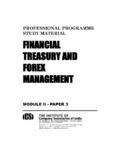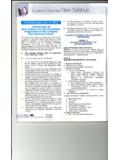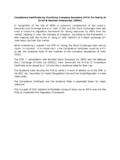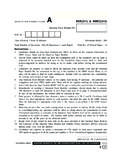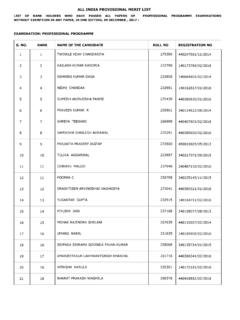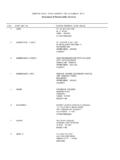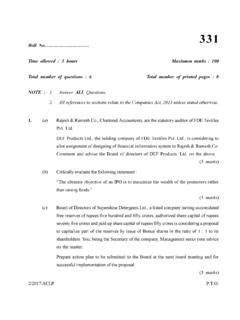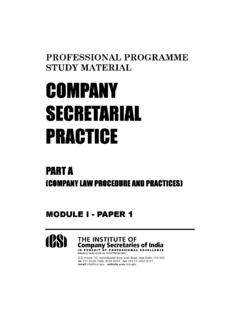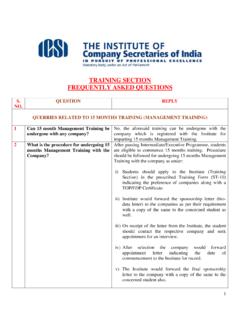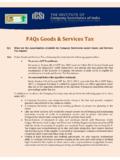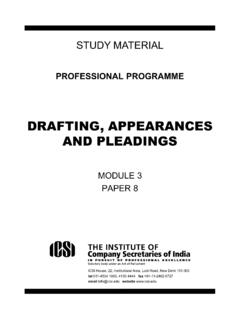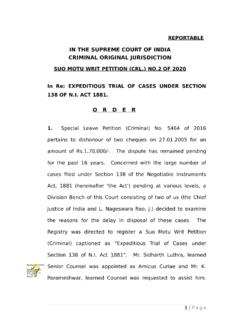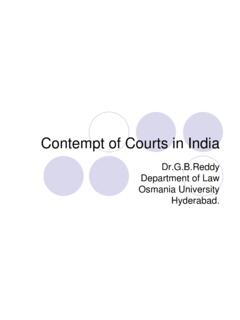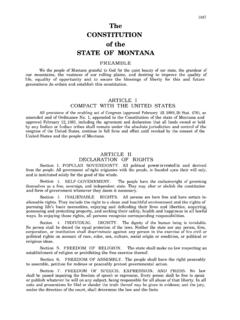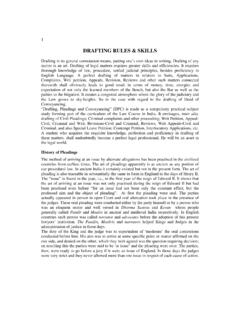Transcription of DIRECT TAX LAW & PRACTICE - ICSI
1 ISTUDY MATERIAL PROFESSIONAL PROGRAMMEDIRECT TAX LAW & PRACTICEMODULE 3 ELECTIVE PAPER ii THE INSTITUTE OF COMPANY SECRETARIES OF INDIATIMING OF HEADQUARTERSM onday to FridayOffice Timings to Dealing TimingsWithout financial transactions to financial transactions to Typesetting by AArushi Graphics, Prashant Vihar, New Delhi, and Printed at SAP Prints/October 2019iiiiiPROFESSIONAL PROGRAMMEDIRECT TAX LAW & PRACTICEThis study material has been published to aid the students in preparing for the DIRECT Tax Law & PRACTICE [Elective Paper] of the CS Professional Programme. It is part of the educational kit and takes the students step by step through each phase of preparation stressing key concepts, pointers and procedures. Company Secretaryship being a professional course, the examination standards are set very high, with emphasis on knowledge of concepts, applications, procedures and case laws, for which sole reliance on the contents of this study material may not be enough.
2 Besides, as per the Company Secretaries Regulations, 1982, students are expected to be conversant with the amendments to the laws made upto six months preceding the date of examination. The material may, therefore, be regarded as the basic material and must be read alongwith the original Bare Acts, Rules, Orders, Case Laws, Student Company Secretary e-bulletin published and supplied to the students by the Institute every month as well as recommended readings given with each study are for PRACTICE purpose only, not to be sent to the institute. There is open book examination for this Elective Subject of Professional Programme. This is to inculcate and develop skills of creative thinking, problem solving and decision making amongst students of its professional programme and to assess their analytical ability, real understanding of facts and concepts and mastery to apply, rather than to simply recall, replicate and reproduce concepts and principles in the : This study material is based on Finance Act, 2019 applicable for Assessment Year 2020-21 and is useful for students appearing in June, 2020 session onwards.
3 The students are expected to update themselves from reference materials available on the Academic Corner of ICSI website. The students may also update themselves of the latest developments, notifications and circulars on DIRECT Tax from subject of DIRECT Tax Law & PRACTICE is inherently complicated and is subjected to constant refinement through new primary legislations, rules and regulations made thereunder and court decisions on specific legal issues. It therefore becomes necessary for every student to constantly update himself with the various changes made as well as judicial pronouncements rendered from time to time by referring to the Institutes journal Chartered Secretary and Student Company Secretary e-bulletin as well as other law/professional journals on DIRECT tax laws. The purpose of this study material is to impart conceptual understanding to the students of the provisions of the DIRECT Tax covered in the Syllabus. This study material has been updated upto 31st August, 2019 and contains relevant amendments made by Finance Act, 2019 applicable for the Assessment Year 2020-21.
4 This is relevant for students appearing in June, 2020 session onwards. However, it may so happen that some developments might have taken place during the printing of the study material and its supply to the students. The students are therefore, advised to refer to the Student Company Secretary e-bulletin and other publications for updation of the study material. In the event of any doubt, students may write to the Institute at for clarification. Although care has been taken in publishing this study material yet the possibility of errors, omissions and/or discrepancies cannot be ruled out. This publication is released with an understanding that the Institute should not be responsible for any errors, omissions and/or discrepancies or any action taken in that behalf. Should there be any discrepancy, error or omission noted in the study material, the Institute shall be obliged if the same are brought to its notice for issue of corrigendum in the Student Company Secretary e-bulletin.
5 IvPROFESSIONAL PROGRAMME DIRECT TAX LAW & PRACTICEAn income tax is a tax that governments impose on income generated by businesses and individuals within their jurisdiction. By law, taxpayers must file an income tax return annually to determine their tax obligations. Income taxes are a source of revenue for governments. They are used to fund public services, pay government obligations, and provide goods for citizens. Income Tax Act, 1961 provides for levy, administration, collection and recovery of Income Tax. It provides progressive rate schedule, exemption limits, and incorporates number of incentive provisions. It provides sound tax system. Rate schedule & Exemption limits are prescribed by Finance tax legislative and judicial environment is constantly evolving, along with globalization, economic shifts, and operational adjustments. Businesses are faced with a tax regime with greater complexities and challenges, nonetheless moving towards a globally cohesive tax world.
6 Now, more than ever, businesses must have an ongoing system for adapting to and staying on top of these complex tax laws of the country undergo significant changes every year on the passing of Annual Finance Act. Apart from the amendments coming out every year through the Finance Act, there are circulars / notifications issued by the CBDT / CBEC to implement the provision of the act, clarifying the scope of the provision. The study material contains detailed provisions related to DIRECT Taxes and comprises of Total 12 lesson. The broad coverage of the lessons is summarized in the below chart. Computation of Income under the head of Salary [Lesson 2] Computation of Income under the head of House Property [Lesson 3] Computation of Income - Profits and Gains from Business and Profession [Lesson 4] Computation of Income under the head of Capital Gains [Lesson 5] Computation of Income from Other Sources [Lesson 6] Computation of Total Income and Tax Liability [Lesson 8] Exemptions/Deduction, Clubbing provisions, Set Off and/or Carry Forward of Losses, Rebate and Relief [Lesson 7] TDS/TCS, Returns, Refund & Recovery [Lesson 9] An Overview of Income Tax Act, 1961 [Lesson 1] Tax Planning & Tax Management [Lesson 10] International Taxation An Overview [Lesson 11] Recent Case Laws [Lesson 12]
7 VROLE OF COMPANY SECRETARIES IN DIRECT TAX LAW The Company Secretaries as experienced tax professionals can assist in resolving various challenges such as keeping abreast with tax regulations, efficiently manage compliances, address uncertain tax positions, among many others. The Company Secretaries can provide with an insight into how to best work to meet the business following are the key important areas under the DIRECT tax regime where a Company Secretaries can play a vital role. Tax ComplianceAdvisory RoleRepresentation ServicesRole of Company Secretaries Tax Compliance : As the complexities of businesses increase, the amount of time spent by professionals in cracking up the law codes increases. However, tax and regulatory systems of even the most developed countries cannot keep pace with the developments across each industry as businesses emerge day by day. These also bring out the requirements for new compliances and the challenges of meeting them every single day.
8 More detailed Income Tax Return forms including disclosures on tax residency certificates and details of foreign assets, and higher penalties for non disclosures require businesses to gear up for efficient tax compliance. Following are the areas or avenues where company secretaries can assist client: l Assist in obtaining Permanent Account Number PAN No. Tax Deduction / Collection Account Number TAN No. l Filling of Income tax Returns l Filling of TDS / TCS returns l Tax Payroll assistance l Income tax clearance certificate l Tax Residency CertificateAdvisory : Corporate taxation is an essential aspect of doing business in India and its importance cannot be undermined. The Company Secretaries can provide the corporate tax advisory services in the following areas:vi l Establishing tax efficient Indian business presence for an MNC. l Planning a heavy capital outlay in the existing business l Addressing concerns about cash flow and examining tax inefficiencies l Ensuring that the tax function is aligned with the business plan l Assessing the impact of any tax and regulatory changes/ amendments Representation Services : The Appellate hierarchy in India consists of assessing officer, first appellate authority, Appellate Tribunal, High Court and Supreme Court.
9 The Company Secretaries can provide the following range of services comprise of: l Assisting in filing appeals before the appellate authorities and complying with appellate requirements and procedure l Determining the appeal strategy and approach and drafting of legal submissions l In-house service of the expert counsel with experience in representation before appellate authorities l Advising on the course of action to be adopted before revenue authorities to mitigate the risk of penal consequences l Reviewing pending litigation and other uncertain tax positions, to comment on adequacy of defense, probability of success and prevention of recurrence l Assisting the external legal counsel in preparing or representing for appeals, writ petition and special leave petition before the Supreme Court and court subordinate to it (High Court)Note : The Study material is based on the provisions of income tax law as amended by the Finance Act, 2019.
10 The study has been updated till 31st August, 2019. The computational / practical problems have been solved on the basis of the provisions of income tax laws applicable for AY 2020-21 FY 2019-20. The study material is relevant for the students for June, 2020 examinations PROGRAMME Module 3 Elective Paper Tax Law & PRACTICE (Max Marks 100)SYLLABUSO bjectiveTo provide advanced knowledge on practical application of DIRECT Tax Contents 1. An Overview of Income Tax Act, 1961 : Background, Important definitions, Residential Status, Basis of Charge, Scope of Total Income, Tax Rates in accordance with the applicable Finance Act for the relevant assessment year. 2. Computation of Income under the head of Salary : Salary Coverage, Employer and Employee Relationship, Allowances, Monetary and Non-Monetary Perquisites Valuation and Taxability, Profits in lieu of Salary, Deductions against Salary, Incomes exempt from Tax and not includible in Salary , Deduction to be made from salary in respect of Provident Fund under the provisions of the Provident Fund and Miscellaneous Provisions of Act 1952 and tax treatment of employers contribution to Provident Fund, Tax Deducted at Source on Salary Income and Compliances, Practical Case Studies.
